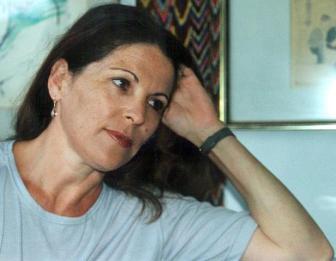Poet
Shulamit Apfel

Shulamit Apfel
(Cyprus, 1948)
© Maya Calderon
Biography
Shulamit Apfel was born in a displaced persons camp in Cyprus to Russian and Romanian Holocaust survivors who moved on to pre-state Israel 10 days after her birth. According to the Israeli daily Haaretz, “more than 2,000 babies [were] born to Jewish refugees interned in Cypriot camps between 1946 and 1949. The infants’ parents had been on their way to [Palestine/Israel] after World War II when the British seized their ships and sent them to Cyprus [. . .] From 1946 to 1949, over a course of 30 months, some 53,000 Jews immigrating to Israel in 40 ships were deported to Cyprus and interned in 12 camps.”
Direct and moving, Apfel’s poetry is open to personal, historical, literary and literary-historical interpretations. This last may be seen in ‘It’s good to have you back’, critic Yitzhak Laor’s review of her latest book:
The poem “ ‘Don’t Ask’ must be read”, he says “in the context of the anxiety of the influence [of the strongest woman member of a masculine clique of Israeli poets in the 1970s] Yona Wallach, and it may be the key to understanding Apfel’s disappearance”, Laor writes. But according to Apfel, the poem is addressed to a mentally troubled sister who died young. To me, many poets will identify with the command in the first two lines, as many of us cringe when asked if we are indeed being creative:
Don’t ask if I’m writing
it’s none of your business. You were the reason
for the escape into metaphors,
the reason for despair.
It’s possible to make a mistake, to think
that your husband had discovered
you’d secretly
gained control of me.
And when I couldn’t take it
any longer
the desire to be buried
was mine.
© Lisa Katz
BIBLIOGRAPHYIn Hebrew
POETRY
A Girl’s Hour [Sha’at yelda], Ahshav, Jerusalem, 1965
Broken Continent [Yabeshet shvura], Ahshav, Tel Aviv, 1972
Distance [Meerhak], Masada, Ramat Gan, 1981
Hoops [Hishukim], Sifryat Poalim, Tel Aviv, 1987
Release [Hatara], Bitan, Tel Aviv, 1989
Nothing But the Truth [Pahot me-emet ain ta’am liktov], Safra, Tel Aviv, 2012
Imagine Being a Star [Teedamnee sheh-at kokhevet], Petal, Tel Aviv, 2017
Memories from the Swimwear Factory, Petal, Tel Aviv, 2020
LINKS
VIDEO: The poet speaks about her interrupted career
SHORT STORY: Personal information
PROSE: Five regrets
The poet's blog
Wikipedia page for Shulamit Apfel
Ohio State University Lexicon of Contemporary Hebrew Literatures
Sponsored by POETRY PLACE
Poems
Poems of Shulamit Apfel
Sponsors
























